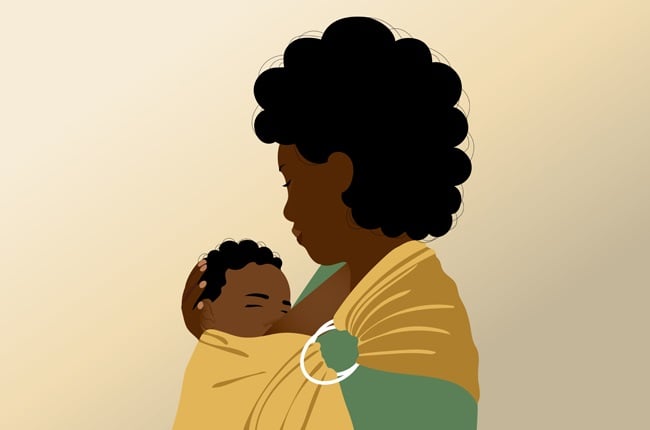
- As a parent with the internet at your fingertips, it's easy to find advice on anything from breastfeeding to picky eating.
- But have you ever wondered how the internet affects child feeding choices?
- With so much information, it can be challenging to navigate it all and ensure you're making the best choice for your child's nutrition.
An infant's nutrition is one of the key building blocks towards ensuring they thrive and reach their optimal potential as children and adults. But, as caregivers, have you ever wondered how the internet affects child feeding choices?
What better time than Child Protection Week, commemorated between 29 May and 5 June, to talk about how getting internet savvy can help protect our children's health? With an estimated 43.5 million South African internet users, this has perhaps never been more relevant.
READ MORE | Postpartum exercise can have many benefits -- here's how to do it safely
Who's making money from your choices?
As a new parent, with the internet at your fingertips, it's easier than ever to find advice on everything from breastfeeding to picky eating. There is, however, also an abundance of advertisements everywhere you look, offering a wide variety of baby products. With so much information out there, it can be difficult to navigate it all and ensure you're making the best choices for your child's nutrition.
First of all, it might be useful to emphasise again the pivotal importance of nutrition in the first 1000 days of your child's life (from conception until 24 months). This is a time of rapid growth and brain development. Exclusive breastfeeding has been identified as the most effective way to combat malnutrition in the first six months of life, which means that for the first six months, the only food an infant receives should ideally be breastmilk. Unfortunately, South Africa has one of the lowest rates on the African continent, with less than 40% of the population being exclusively breastfed.
READ MORE | Eve by Claire Horn: 'We are closer than ever to the first pregnancy outside the human body'
In March this year, The Lancet released the 2023 series on breastfeeding, which identified the marketing of breastmilk substitutes (formula milk) as a major barrier to exclusive breastfeeding. It highlights how formula milk companies downplay the benefits of breastfeeding in their marketing strategies, broadcasting it as being outdated, antifeminist and generic. Research has, however, repeatedly shown that human milk is the best for babies' development and that there is a large nutritional gap between formula and breastmilk.
The report also illustrates how marketing companies even target health professionals, as they are seen as an influential source of information for infant feeding. Formula milk companies position formula as an acceptable, harmless complement to breastfeeding, whereas in reality, including formula into a baby's diet will mean that the baby receives less breastmilk, containing abundant immune-protecting components. Although there are regulations in place to monitor the marketing of breastmilk substitutes, it doesn't change the fact that the way it is marketed has the ability to change mothers' and caregivers' decisions by downplaying truthful information.
Social media and your choices
With online information becoming more common, it can, of course, also play a role in influencing whether or not a mother decides to breastfeed. A study exploring social media group use among breastfeeding mothers found that the media can have a positive impact by providing support. This could be through forum groups, chat rooms or breastfeeding influencers on social media. Through sharing experiences, these online sites can empower mothers to confidently breastfeed their babies and overcome any challenges they may encounter. But there is also the flip side: one study illustrated how, when mothers turn to the internet for advice or support, it is rare that they can find a reputable source.
This could sway them to make a misinformed decision when, for example, only one side of the argument is represented, information is withheld, or the information is skewed based on personal experiences or financial incentives. For example, many websites promote formula milk over breastmilk for convenience without showing that breastfeeding is actually better for the baby. This supports findings from the Lancet paper.
Misinformation on infant feeding can also extend to complementary feeding, an eating phase recommended from six months when exclusive breastfeeding ends and solid foods are gradually introduced. Caregivers should be vigilant of inappropriate advice during this period and focus on evidence-based complementary feeding practices to prevent an infant's growth from faltering. The popularity of social media influencers on platforms like Instagram, Facebook and TikTok has grown at an overwhelming pace in the past five years, and the information shared is often not evidenced based. This can have detrimental effects on the choices of caregivers who consume this media, for example feeding their children the incorrect amount and consistency for their ages.
READ MORE | Try these breathing exercises to combat stress during pregnancy
What can be done
Knowing what to feed infants is not the sole responsibility of the main caregiver. It is also the environment and society's collective responsibility to support them, which can be done through the sharing of accurate and appropriate information online. The government offers support by creating policies to protect infant and young child nutrition. However, government and health organisations (private and public) should take decisive steps to improve nutrition in the first 1000 days by ensuring that these policies are not just created but implemented and regulated appropriately. In addition, the education of mothers should be a top priority in healthcare systems to empower them to appropriately feed their children.
And finally, caregivers should know when to turn to a registered healthcare professional (preferably with no connection to companies which can create bias) for counselling or when to use resources like the Road to Health booklet or Side-by-Side website for evidence-based information.
Here are six tips to help caregivers critically assess the information they find online and, in so doing, help protect the nutrition of our children and invest in the future of South Africa:
Want to learn more? Visit these websites:
READ MORE | Not just the baby blues: Depression during pregnancy can harm both mother and child, expert warns
6 Tips to help you find credible nutrition information
- Look at the author's name and accreditations - this can help you see if they are writing based on actual research done or if it is just click-bait. Choose articles by registered healthcare professionals, such as a "registered dietitian", or that information has been obtained by the journalist/blogger from such a professional.
- When using information from the internet, look for articles that are peer-reviewed or written by well-established organisations that do not stand to gain financially from the information they provide. Articles will typically include the words "peer-reviewed" on the article website.
- Check the date of when the information you are reading was published - if it is an old article, the information might be outdated, making it untrustworthy.
- With magazine articles or social media platforms, first, see if the information has been backed up with research. They should usually include links to articles that they used to write theirs, and if these articles are trustworthy, then the compiled information should be trustworthy, too.
- Be aware of posts made for financial gain or incentives by looking out for phrases such as "paid partnership", "AD", "promoted post", or "boosted post".
- And lastly, it is always best to trust a healthcare professional, especially when it comes to your child's nutrition and their future. If you have any questions or need help with what to trust online, talk to your GP or a nurse at your local clinic.
Jemma van den Berg and Anri Roome are final year BSc Dietetics students at Stellenbosch University.




 Publications
Publications
 Partners
Partners











